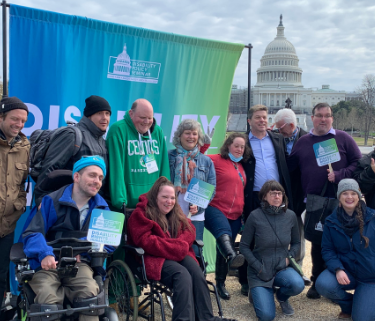Care in Crisis: Disability Rights Advocates Rally at U.S. Capitol to Demand Care Investment
WASHINGTON, DC – Today, disability rights advocates rallied in front of the U.S. Capitol to send an important message: disability rights are human rights, and those rights include the right to live in the community, work, and have relationships. A recording of the rally can be viewed here.
People with intellectual and developmental disabilities (IDD), parents, direct support professionals, other leadership from The Arc, and partnering disability organizations delivered this message at a critical point as Congress continues to work on a bill to invest in care. Hundreds of advocates showed the strength of the disability community and the growing movement, and were joined by U.S. Representative Ayanna Pressley (MA-7) and U.S. Senator Sherrod Brown (OH), who also both delivered remarks in support of disability rights.
We called on Congress to invest now in home and community-based services (HCBS) so that people with IDD can live at home in their own communities with the supports they need. More than 800,000 people are stuck on wait lists for services to help them live their daily lives. More funding can also mean living wages for direct care workers. We also called on Congress to finally update the Supplemental Security Income (SSI) program that allows many people with disabilities to access HCBS.
Rally participants traveled from across the country for this urgent advocacy moment.
Ric Nelson came from Alaska, where he is Advocacy and Outreach Manager at The Arc of Anchorage. He told the crowd the time is now for Congress to take action.
“We need to tell Congress about home and community-based services. It’s not an option, it’s a right. It’s a right for us to live in our communities! And work! And have relationships!” said Nelson. “It’s a right for us to have the same freedoms as everybody else. We have that right and we demand that right.”
HCBS allows people with IDD to live at home in their own communities with the supports they need. People with disabilities rely on HCBS for everyday things like employment supports, getting around in the community, dressing, bathing, meal preparation, taking medication, and more. But there isn’t enough money in the HCBS program to support everyone and pay a fair wage.
People with disabilities also rely on the SSI program to access HCBS. Many of the rules of the SSI program were last updated in 1972, so today, the program penalizes people with disabilities who marry and prevents people with disabilities on SSI from saving money via outdated asset limits. These rules desperately need to be updated.
The direct care workers who provide HCBS are underpaid, which leads to high turnover, critical staffing shortages, and compromised care for many people with disabilities. All too often, this means unpaid family caregivers are filling in the gaps of care.
Aryana Ingram, a direct support professional with RCM of Washington and certified caregiver with Home Helpers of Bowie, Maryland, spoke about her passion for caring for others and the need for fair pay. Ingram’s client William is the chief receptionist for The Arc of the United States.
“We need to invest more in caregiving. I work two jobs, working 6, sometimes 7 days a week to make ends meet. In order to live comfortably, that’s what I must do. I’m thankful for what I do have, but it would be greatly appreciated to receive what I deserve and need,” said Ingram. “We need our government to respect and invest in our needs right here, for our fellow caregivers who do so much because we love and respect our fellow people.”
“The lives of people with disabilities have value. We need Congress to recognize their value by investing in home and community-based services,” said Peter Berns, Chief Executive Officer of The Arc of the U.S. “We need Congress to end the waiting lists for home and community-based services. And we need Congress to raise the asset and income limits so that people with disabilities don’t have to live in poverty in order to get the help that they need.”
Kevin Wright with the DC Developmental Disabilities Council closed out the rally, stating “I always say that everyone has the same rights as others … to get the supports you need. Congress should just wake up and listen to these kind of things.”
Today’s care rally marks the end of this week’s annual Disability Policy Seminar, hosted by The Arc of the U.S., the American Association on Intellectual and Developmental Disabilities (AAIDD), the Autism Society, the Association of University Centers on Disabilities (AUCD), the National Association of Councils on Developmental Disabilities (NACDD), Self-Advocates Becoming Empowered, and United Cerebral Palsy (UCP).















